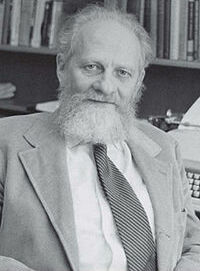Peter Blau
 Peter Michael Blau (February 7, 1918 – March 12, 2002) was an American sociologist and theorist. Born in Vienna, Austria, he immigrated to the United States in 1939. He completed his PhD doctoral thesis with Robert K. Merton at Columbia University in 1952, laying an early theory for the dynamics of bureaucracy. The next year, he was offered a professorship at the University of Chicago, where he taught from 1953 to 1970. He also taught as Pitt Professor at Cambridge University in Great Britain, as a senior fellow at King's College, and as a Distinguished Honorary professor at Tianjin Academy of Social Sciences which he helped to establish. In 1970 he returned to Columbia University, where he was awarded the lifetime position of Professor Emeritus. From 1988 to 2000 he taught as the Robert Broughton Distinguished Research Professor at University of North Carolina, Chapel Hill in the same department as his wife, Judith Blau, while continuing to commute to New York to meet with graduate students and colleagues.
Peter Michael Blau (February 7, 1918 – March 12, 2002) was an American sociologist and theorist. Born in Vienna, Austria, he immigrated to the United States in 1939. He completed his PhD doctoral thesis with Robert K. Merton at Columbia University in 1952, laying an early theory for the dynamics of bureaucracy. The next year, he was offered a professorship at the University of Chicago, where he taught from 1953 to 1970. He also taught as Pitt Professor at Cambridge University in Great Britain, as a senior fellow at King's College, and as a Distinguished Honorary professor at Tianjin Academy of Social Sciences which he helped to establish. In 1970 he returned to Columbia University, where he was awarded the lifetime position of Professor Emeritus. From 1988 to 2000 he taught as the Robert Broughton Distinguished Research Professor at University of North Carolina, Chapel Hill in the same department as his wife, Judith Blau, while continuing to commute to New York to meet with graduate students and colleagues.His sociological specialty was in organizational and social structures. He formulated theories relating to many aspects of social phenomena, including upward mobility, occupational opportunity, and heterogeneity. From each of his theories, he deduced an hypothesis which he would test against large scale empirical research. He was one of the first sociological theorists to use high level statistics to develop sociology as a scientific discipline using macro-level empirical data to gird theory. He also produced theories on how population structures can influence human behavior.
One of Blau's most important contributions to social theory is his work regarding exchange theory, which explains how small-scale social exchange directly relates to social structures at a societal level.
He also was the first to map out the wide variety of social forces, dubbed "Blau space" by Miller McPherson. This idea was one of the first to take individuals and distribute them along a multidimensional space. Blau-space is still used as a guide by sociologists and has been expanded to include areas of sociology never specifically covered by Blau himself.
In 1974 Blau served as the 65th president of the American Sociological Association. Provided by Wikipedia
1
2
3
4
5
6
9
10
11
12
13
14
16
17
18
19
20